英语初二下外研版module8学案-时间状语从句详解
外研版八年级英语下册 Module 8 Time off 知识点讲解
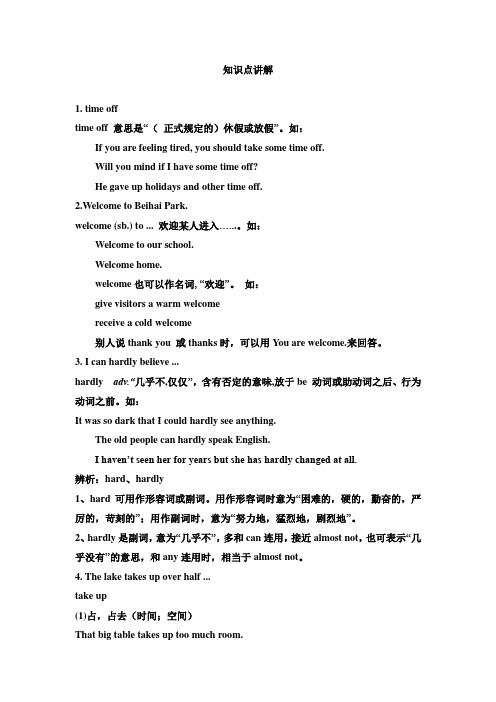
知识点讲解1. time offtime off 意思是“(正式规定的)休假或放假”。
如:If you are feeling tired, you should take some time off.Will you mind if I have some time off?He gave up holidays and other time off.2.Welcome to Beihai Park.welcome (sb.) to ... 欢迎某人进入…...。
如:Welcome to our school.Welcome home.welcome也可以作名词, “欢迎”。
如:give visitors a warm welcomereceive a cold welcome别人说thank you 或thanks时,可以用You are welcome.来回答。
3. I can hardly believe ...hardly adv.“几乎不,仅仅”,含有否定的意味,放于be 动词或助动词之后、行为动词之前。
如:It was so dark that I could hardly see anything.The old people can hardly speak English.I haven’t seen her for years but she has hardly changed at all.辨析:hard、hardly1、hard可用作形容词或副词。
用作形容词时意为“困难的,硬的,勤奋的,严厉的,苛刻的”;用作副词时,意为“努力地,猛烈地,剧烈地”。
2、hardly是副词,意为“几乎不”,多和can连用,接近almost not,也可表示“几乎没有”的意思,和any连用时,相当于almost not。
4. The lake takes up over half ...take up(1)占,占去(时间;空间)That big table takes up too much room.Learning English takes up a lot of my time.That boy took my time up with his questions.(2)开始从事He had studied Japanese for a year and a half before he took up English.We took up physical chemistry at college.The scientist has taken up a new subject.5. point outpoint out 指出,说明;使注意到Did he point out where you were wrong?No matter who point out our shortcoming, we will correct them.Point out the mistake in this sentence, please.[辨析] point at, point to, point outpoint to和point at都有“指向”之意,有时可以互换。
八年级英语下册 Module 8 Public holidays重难点解析 外研版
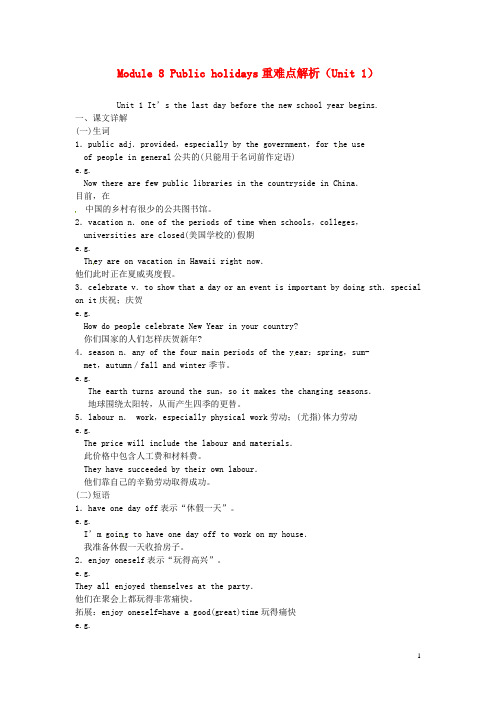
Module 8 Public holidays重难点解析(Unit 1)Unit 1 It’s the last day before the new school year begins.一、课文详解(一)生词1.public adj.provided,especially by the government,for t he useof people in general公共的(只能用于名词前作定语)e.g.Now there are few public libraries in the countryside in China.目前,在中国的乡村有很少的公共图书馆。
2.vacation n.one of the periods of time when schools,colleges,universities are closed(美国学校的)假期e.g.Th ey are on vacation in Hawaii right now.他们此时正在夏威夷度假。
3.celebrate v.to show that a day or an event is important by doing sth.special on it庆祝;庆贺e.g.How do people celebrate New Year in your country?你们国家的人们怎样庆贺新年?4.season n.any of the four main periods of the y ear:spring,sum-met,autumn/fall and winter季节。
e.g.The earth turns around the sun,so it makes the changing seasons.地球围绕太阳转,从而产生四季的更替。
5.labour n. work,especially physical work劳动;(尤指)体力劳动e.g.The price will include the labour and materials.此价格中包含人工费和材料费。
2024年春八年级英语下册Module8Timeoff模块整体分析新版外研版
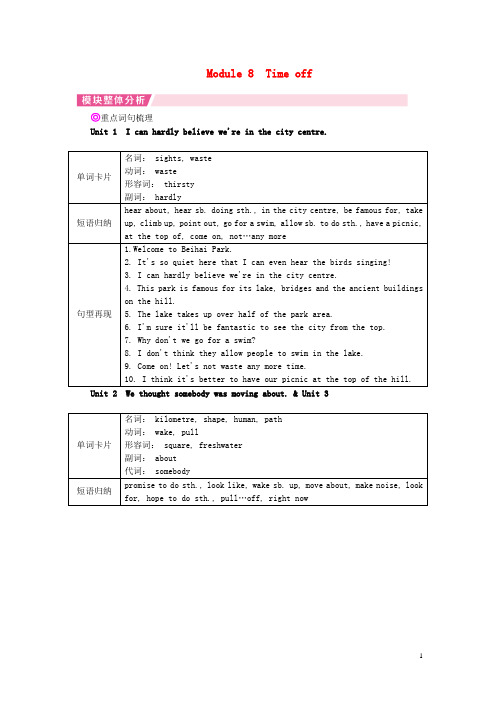
Module 8 Time off Unit 1I can hardly believe we're in the city centre.单词卡片名词: sights, waste 动词: waste形容词: thirsty副词: hardly短语归纳hear about, hear sb. doing sth., in the city centre, be famous for, take up, climb up, point out, go for a swim, allow sb. to do sth., have a picnic, at the top of, come on, not…any more句型再现1.Welcome to Beihai Park.2. It's so quiet here that I can even hear the birds singing!3. I can hardly believe we're in the city centre.4. This park is famous for its lake, bridges and the ancient buildings on the hill.5. The lake takes up over half of the park area.6. I'm sure it'll be fantastic to see the city from the top.7. Why don't we go for a swim?8. I don't think they allow people to swim in the lake.9. Come on! Let's not waste any more time.10. I think it's better to have our picnic at the top of the hill.Unit 2We thought somebody was moving about. & Unit 3单词卡片名词: kilometre, shape, human, path 动词: wake, pull形容词: square, freshwater副词: about代词: somebody短语归纳promise to do sth., look like, wake sb. up, move about, make noise, look for, hope to do sth., pull…off, right now(续表)句型再现1. I promised to write, so…st night we camped by a small lake.3. We thought somebody was moving about.4. We came out without making any noise, and found it was justa hungry monkey looking for food.5. Tomorrow we're going to Dongting Lake, the secondlargest freshwater lake in China.6. Wish you were here!7. I pulled a leaf off a plant, but Lingling's uncle said that it was wrong to pull leaves off plants and that we should protect everything here.教材内容解读本模块以“旅游和休假”为话题,绽开听、说、读、写一系列语言实践活动。
外研版八年级英语下册Module 8 Time off单元要点精析
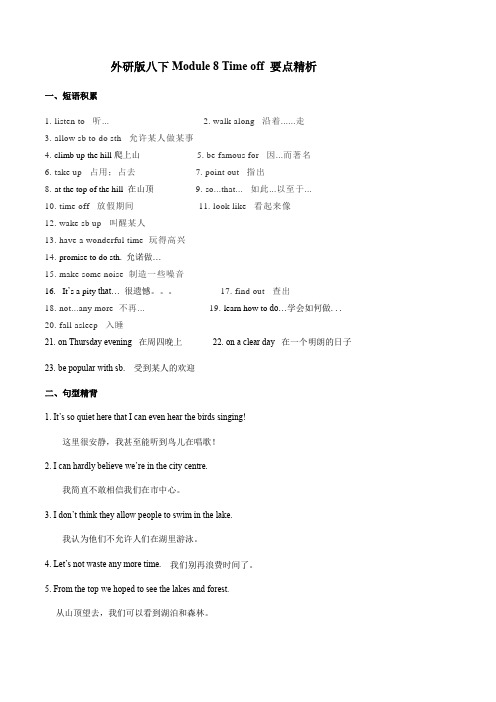
外研版八下Module 8 Time off 要点精析一、短语积累1. listen to 听...2. walk along 沿着......走3. allow sb to do sth 允许某人做某事4. climb up the hill爬上山5. be famous for 因...而著名6. take up 占用;占去7. point out 指出8. at the top of the hill 在山顶9. so...that... 如此...以至于...10. time off 放假期间11. look like 看起来像12. wake sb up 叫醒某人13. have a wonderful time 玩得高兴14. promise to do sth. 允诺做…15. make some noise 制造一些噪音16. It’s a pity that…很遗憾。
17. find out 查出18. not...any more 不再... 19. learn how to do…学会如何做. . .20. fall asleep 入睡21.on Thursday evening在周四晚上22.on a clear day 在一个明朗的日子23.be popular with sb. 受到某人的欢迎二、句型精背1. It’s so quiet here that I can even hear the birds singing!这里很安静,我甚至能听到鸟儿在唱歌!2. I can hardly believe we’re in the city centre.我简直不敢相信我们在市中心。
3. I don’t think they allow people to swim in the lake.我认为他们不允许人们在湖里游泳。
4. Let’s not waste any more time. 我们别再浪费时间了。
八年级时间状语从句教案

八年级时间状语从句教案一、教学目标:1. 让学生掌握时间状语从句的定义和用法。
2. 让学生能够正确地运用时间状语从句表达时间背景和动作发生的时间。
3. 提高学生英语句子构建和表达的能力。
二、教学重难点:1. 重点:时间状语从句的定义、结构和用法。
2. 难点:正确运用时间状语从句表达具体场景。
三、教学方法:1. 采用情境教学法,通过设定各种场景,让学生在实际语境中学习、运用时间状语从句。
2. 用例句解析法,分析典型例句,使学生掌握时间状语从句的用法。
3. 采用分组讨论法,让学生分组讨论,共同探讨时间状语从句的运用。
四、教学内容:1. 时间状语从句的定义和结构。
2. 常见的时间状语从句引导词:when, whenever, while, as soon as, before, after, until, since, for等。
3. 各时间状语从句引导词的用法和例句。
五、教学过程:1. 导入:通过提问方式引导学生回顾并列句的概念,为新课学习做铺垫。
2. 讲解:讲解时间状语从句的定义、结构和常见引导词,结合例句进行分析。
3. 练习:让学生用所学的引导词填空,构成时间状语从句,并进行分组讨论。
4. 场景模拟:设置各种场景,让学生运用时间状语从句进行实际操作。
6. 作业布置:布置相关练习题,巩固所学知识。
六、教学反馈:1. 课堂提问:通过提问了解学生对时间状语从句的理解程度。
2. 练习情况:观察学生在练习中的表现,了解他们对时间状语从句的掌握情况。
3. 场景模拟:评估学生在场景模拟中的表现,检验他们运用时间状语从句的能力。
七、教学拓展:1. 对比并列句和时间状语从句的用法,让学生了解两者的区别。
2. 介绍时间状语从句在实际生活中的应用,提高学生英语运用能力。
3. 引导学生关注时间状语从句在其他英语语法中的运用,如条件状语从句、地点状语从句等。
八、教学评估:1. 课堂练习:评估学生在课堂练习中的表现,了解他们对时间状语从句的掌握程度。
八年级英语下册Module8Publicholidays时刻状语从句外研版

八年级英语下册 Module 8 Public holidays 时刻状语从句外研版时刻状语从句:列位观众,大伙儿好!我是时刻状语从句,我的作用是用一个句子(从句)来作另一个句子(主句)的时刻状语,表示一个句子(主句)谓语动作发生的时刻,请看大屏幕:凡是从句都必需有引导词,引导我时刻状语从句的从属连词很多,请看:1. when"当……时",引导时刻状语从句时,从句用于表示主句动作发生的特定时刻。
例如:The days get longer when spring comes.春天到来时,白天变得更长了。
"在……之前",引导时刻状语从句时,表示主句动作发生在从句动作之前。
例如:Close the door before you leave the room.离开房间前关上门。
"在……以后",引导时刻状语从句时,表示主句的动作发生在从句的动作以后。
例如:I went to bed after I finished my homework.做完作业后我就去睡觉了。
soon as "一……就……",引导时刻状语从句时,表示主句动作紧接着从句动作发生。
例如:I'll telephone you as soon as I get there.我一到那儿就给你打电话。
、till"直到",引导时刻状语从句。
当主句谓语动词是延续性动词时,主句常常利用确信形式;当主句谓语动词是非延续性动词时,主句要用否定形式,即"not ... until / till ..."意为"直到……才……"。
例如:I'll wait here until / till he comes back.我将在那个地址等着,直到他回来。
You can't go home until / till you finish your work.直到你完成你的工作,你才能回家。
八年级英语下册:Module 8 Unit 3 Language in use讲学稿(外研版)

Module 8 Public holidayUnit 3 Language in use一、学习目标:掌握好时间状语从句,会运用好when,while after , before , until 引导的从句语法分析:用句子来表达一件事或一次行为发生的时间的,在英语里这个句子叫做时间状语从句1when 连接的时间从句when 当。
的时候When I feel tired, I will have a rest.2 Before / after 连接的时间状语从句before 表示“在、、、之前”after 表示“在、、、之后”在他母亲回家之前。
他把电视关了。
He turned off the TV before his mother came back home.在吃完饭后,他们出去散步了。
They went out for a walk after they had a meal.3 as soon as 连接的时间从句as soon as 表示“一、、、、就、、、”强调动作紧密相连。
一响他就拿起来。
He picked up the phone as soon as it rang.4 until 连接的时间从句until表示一个动作一直持续到某一时刻,即“直到、、、”直到他母亲叫醒他,他才起床。
He didn’t get up until his mother woke him up.5 while连接的时间从句While连接时间状语时,表示言主句的行为在从句行为过程之中发生。
由于while从句表示一个持续的行为。
所以从句中要用持续性动词或状态动词,并且持续性动词常用进行时态。
当婴儿在睡觉时,母亲洗衣服。
The mother did some washing while her baby was sleeping.二、重点和难点1 Do you get out of bed as soon as you wake up?get out of bed 起床eg:每天他闹钟一响,他就起床。
八下英语Module8
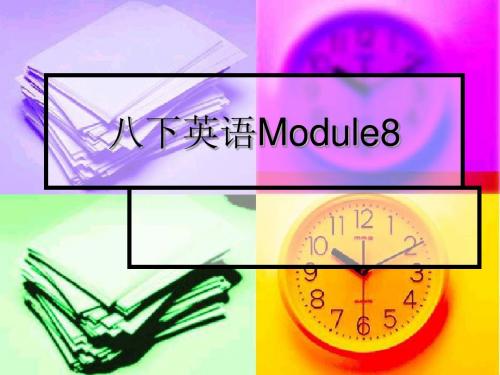
9. list n. 列表,名单 常与介词on 连用,构成短语 on the list 在清单上,在表上。 a list of 一列,一栏 before I go shopping, I make a list of the things I must buy . please put the new comers’ names on the list. A shopping list. 购物清单 a price list 价目表
6.ending n. 结尾,结局
The story has a surprise ending. A good beginning makes a good ending. A bad beginning makes a bad ending. I like romantic films because they usually have happy endings.
8. resolution n. 决心,决定
make a resolution I have made a New Year resolution to give up drinking. He is always making good resolutions but he never carries them out .(实行)
4.vacation n.假期,休假 没有复数形式 On vacation 度假
I will go to Beijing for my vacation next month .下个月我将要去北京度假 Tom’s parents are on vacation . 汤姆 的父母在度假 Do you like going on vacation ? 你想 要去度假吗? Please tell me where they would like to go on vacation .请告诉我他们想去 哪里度假
外研版八年级英语下册Module8Timeoff教案

外研版⼋年级英语下册Module8Timeoff教案Module 8 Time off【教材分析】Module 8的主要内容为运⽤that引导的宾语从句来描述⾃⼰和他⼈的旅⾏(北海公园和张家界)。
从全书来看,本模块承接下⼀模块对宾语从句的学习和运⽤,着重that引导的宾语从句的使⽤,让同学们通过课堂活动来掌握其⽤法。
Unit 1 I can hardly believe we’re in the city centre.【教学⽬标】Knowledge objective1. Words: hardly,sights,thirsty,waste2. Expressions: take up,point out,at the top of3. Grammar: the object clauseAbility objective能听懂和阅读关于介绍去北海公园旅⾏的语⾔材料,能通过相关词汇和图⽚描述⾃⼰和他⼈的对北海公园的观点;能编写关于旅⾏的对话。
Moral objective学会倾听他⼈的旅⾏经历和观点;激发学⽣对⼤⾃然的热爱,陶冶情操,激发建设祖国的热情;培养学⽣的环境保护意识。
【教学重点】The object clauses【教学难点】1. The object clauses2. hard和hardly的区别【教学⽅法】PWP method,task-based method and interactive approach【教学⼿段】A tape recorder,multimedia and some pictures【教学过程】Teaching Procedures:Step 1 Warming up1. Ask Ss to tell something about Beihai Park.2. Ss look and describe the pictures of Beihai Park.Step 2 Listening1. Look at the photo and listen to Part 1.What is the conversation about?2. Listen again and choose the correct answer.1) Tony has/hasn’t heard about Beihai Park.2)Tony guesses that the park is very popular /not very popular.3)Linging suggests that they spend the day there/ Daming and Betty come too.4)Linging thinks/ doesn’t think the park will be busy.Step 3 Reading1. Learn some new words and phrase.Show the pictures of new words and let the students to say as quickly as possible.2. Read the dialogue and mark T or F.1) Beihai Park is in the city centre. ( )2) The ancient buildings take up over half of the park area. ( )3) The y don’t allow people to swim in the lake because it’s dangerous. ( )3. Listen to the dialogue and complete the sentences about Beihai Park.1) Beihai Park is so ______ that you can even hear the birds singing.2) The park is famous for its ______,bridges and the ancient buildings on the hill.3) The lake takes up _________ of the park area.4) You can point out the ________ of Beijing from the top of the hill.5) They do not allow people to swim ___________.Step 4 Language points1. It’s so q uiet here that I can even hear the birds singing!so…that 引导结果状语从句,意为“如此……,以⾄于……”。
英语初二下外研版module8unit3学案

英语初二下外研版module8unit3学案Module8PublicholidayUnit3LanguageinuseRevision:Grammar:时间状语从句用句子来表达一件情况或一个行为发生的时间,如此的句子称为时间状语从句。
时间状语从句能够放在句首,句中和句尾。
常用的引导词有when,while,before,after,until和扩展:since引导的时间状语从句常用过去时,主句用一般现在时或完成时。
1.Mumwasmakingcookiesinthekitchen__________thetelephonerang.2.IwaswatchingTV__________mywifewascooking.3.Hehadworkedinafactoryfortwoyears__________hewenttocollege.4.Fouryearshaspassed__________hemarried.5.Ishallplaychesswithyou__________IfinishwatchingTV.6.Hedidn'tgettotheairport__________itwasdark.Languagepoints:1.beready意为“预备好”,相当于getready,前者表示状态,后者表示动作。
常用的结构是:be/getreadyforsth.为某人做某事be/getreadytodosth.预备好做某事Animalsaregettingreadyforthecoldwinter.I’mreadytostartwork.2.wear+颜色,表示“穿着某种颜色的衣服”Shelikestowearblue.Wearsth.表穿着的状态或喜爱穿..Mr.Blackiswearingawhiteshirt.putonsth.“穿上,戴上,表穿的动作It’sverycoldoutside,putonyourcoat.bein+颜色或衣服的词Isyoursoninabluejacket?3.like…betterthan….比起…更喜爱…相当于preferdoingtodoingJimlikesplayingfootballbetterthanplayingthepiano.=Jimprefersplayingfootballtoplayingthepinao.4.colour….green/red/pink把….涂成绿色/红色/粉红色colour是动词,意为“给…上色”Lucylikescolouringherpicturespink.5.It’sbettertodosth.做某事更好It’sbettertokeeptheflowersinthewarmroominwinter.。
2018-2019学年八年级英语下册Module8Timeoff词句精讲精练含解析新版外研版.doc

Module 8 Time off 词汇精讲1. hardly hardly & hard是一个表示否认观点的副词,是由hard(adv. & adj.困难的,努力)+-ly(副词后缀)演变而来。
hard 又能够作副词“努力”,如 study hard, work hard 。
The problem is too hard, I can't work it out.这个问题太难了,我算不出来。
hardly 是拥有否认意味的词,它不可以再与其余否认词一同连用,在由它组成的反意疑问句中,尾句的疑问式须用一定式。
Hardly anybody (Almost nobody) came to the meeting.几乎没有人来开会。
He can hardly speak English, can he? 他不太会说英语,对吧? Icould hardly hear the speaker. 我几乎听不到演说者的声音。
It'sraining hard. We can hardly see the sign on the road. 雨下得很大。
我们几乎看不到路面的标记。
2. waste(1)waste 作不行数名词,意为“浪费,废物,垃圾”。
a waste of 意为“浪费”。
比如:I hate waste.我厌烦浪费。
It ’ s a waste of time这.就是浪费时间。
(2 )waste 作形容词,意为“无用的,浪费的,荒弃的”。
比如:We shouldn ’ t throw waste paper about. 我们不该当乱扔废纸。
A factory is pouring waste water into the river. 一家工厂正在向河里倾倒废水。
(3 )waste 作及物动词,意为“浪费”。
Don’ t waste water! 不要浪费水。
3. humanhuman 意为“人;人类”,指有别于动物及其余生物的“人”,其复数为humans。
八年级时间状语从句教案
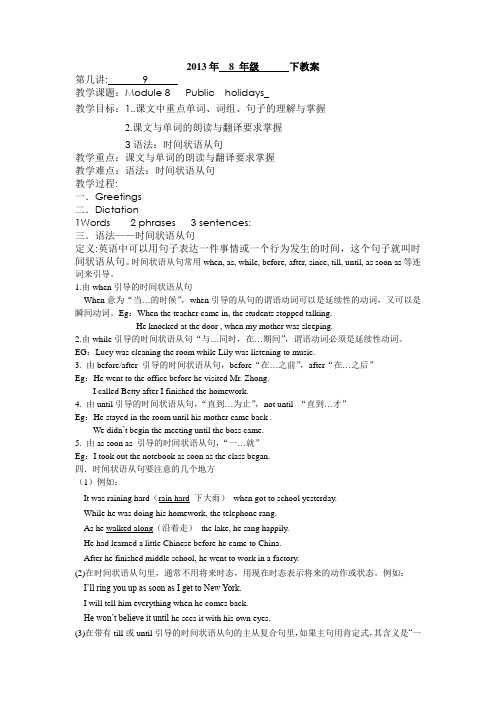
2013年8 年级下教案第几讲: 9教学课题:Module 8 Public holidays教学目标:1..课文中重点单词、词组、句子的理解与掌握2.课文与单词的朗读与翻译要求掌握3语法:时间状语从句教学重点:课文与单词的朗读与翻译要求掌握教学难点:语法:时间状语从句教学过程:一.Greetings二.Dictation1Words 2 phrases 3 sentences:三.语法——时间状语从句定义:英语中可以用句子表达一件事情或一个行为发生的时间,这个句子就叫时间状语从句。
时间状语从句常用when, as, while, before, after, since, till, until, as soon as等连词来引导。
1.由when引导的时间状语从句When意为“当…的时候”,when引导的从句的谓语动词可以是延续性的动词,又可以是瞬间动词。
Eg:When the teacher came in, the students stopped talking.He knocked at the door , when my mother was sleeping.2.由while引导的时间状语从句“与…同时,在…期间”,谓语动词必须是延续性动词。
EG:Lucy was cleaning the room while Lily was listening to music.3. 由before/after 引导的时间状语从句,before“在…之前”,after“在…之后”Eg:He went to the office before he visited Mr. Zhong.I called Betty after I finished the homework.4. 由until引导的时间状语从句,“直到…为止”,not until “直到…才”Eg:He stayed in the room until his mother came back .We didn’t begin the meeting until the boss came.5. 由as soon as 引导的时间状语从句,“一…就”Eg:I took out the notebook as soon as the class began.四.时间状语从句要注意的几个地方(1)例如:It was raining hard(rain hard 下大雨)when got to school yesterday.While he was doing his homework, the telephone rang.As he walked along(沿着走)the lake, he sang happily.He had learned a little Chinese before he came to China.After he finished middle school, he went to work in a factory.(2)在时间状语从句里,通常不用将来时态,用现在时态表示将来的动作或状态。
外研版八年级状语从句

If 引导的条件状语从句If 可以表示是否,也可以表示如果的意思。
当其表示是否时可用来引导宾语从句,而为如果的时候则引导条件状语从句。
一、条件状语从句的定义:在一个复合句中,从句作为主句的条件,所以这个句子是条件状语从句。
二、八年级所学的两种if引导的条件状语从句:(1) if 从句+祈使句,或者调换位置:祈使句+if从句e.g.:If you want to go, please call me. / Please call me if you want to go(2) if 从句+基本句,或者调换位置:基本句+if 从句。
但是在我们本学期学的一般是:用了一般现在时的if 从句+用了一般将来时的基本句。
E.g: I won’t go hiking if it rains tomorrow. 也就是说主句用一般将来时,从句用一般现在时表示将来的意义。
三、考试技巧1. 在选择题中,遇到if的情况,我们首先要判断if的意义是为是否还是如果。
如果表示是否,这个句子为宾语从句,如果是如果,则为条件状语从句。
2. 假如从句是在前面的话,比如,If you don’t go ,I won’t go wither. 这个句子不用多加考虑,一定是条件状语从句。
(为什么呢,自己思考)时间状语从句一、什么是时间状语从句在一个复合句中,从句表达的意思是主句动作或状态发生的时间,那么这个表示时间的从句就叫做时间状语从句。
二、引导词在我们本学期里,我们要掌握的引导词有下面六个:when(当……的时候),while(当……的时候),before(在……之前),after(在……之后), as soon as(一……就……),until(直到……)1. when与while 当……的时候(1)when 引导的时间状语从句,可以表示一个时间点,也可以表示时间段。
所以when引导的从句可以用短暂性动词,也可以用延续性动词。
While引导的从句表示一个时间段,所以while从句中的谓语是延续性动词。
外研版英语八年级下册Module 8语法要点总结

Module 8 Time offI.词汇短语(课本词汇)II.语句精讲(北大绿卡)1.I can’t hardly believe we’re in the city center.我简直不能相信我们是市中心。
hardly adv. 几乎不;几乎没There is hardly any food in the fridge. 冰箱里面没有什么吃的了。
The seats are hard and uncomfortable. 这些座位又硬又不舒服。
This problem is not hard. 这道题不难。
We should study hard. 我们应该努力学习。
2.The lake takes up over half of the park area. 湖占据了这个公园一半多的面积。
take up 占去(时间或空间)The big box took up two seats. 那个大盒子占了两个座位。
The homework takes up all his time. 家庭作业占用了他的所有时间。
【注意】take up 与tidy up 一样,也是由“动词+副词”构成的短语,当它的宾语是代词时,必修放在两词之间。
The computer is not yours. You shouldn’t take it up.这台电脑不是你的。
你不应该占用它。
3.Then I can point out the sights of Beijing for you.然后我可以为你们指出北京的景点。
Point out 指出;指明Thank you for pointing out my mistakes. 谢谢你指出我的错误。
【注意】Point out 是“动词+副词”型短语,其宾语可以是名词、代词或that从句。
代词做其宾语时,要放在point 和out 之间。
4.I think It’s better to have our picnic at the top of the hill.我想到山顶吃我们的野餐比较好。
外研版八年级下册英语 Module 8 Time off 语法知识点复习提纲
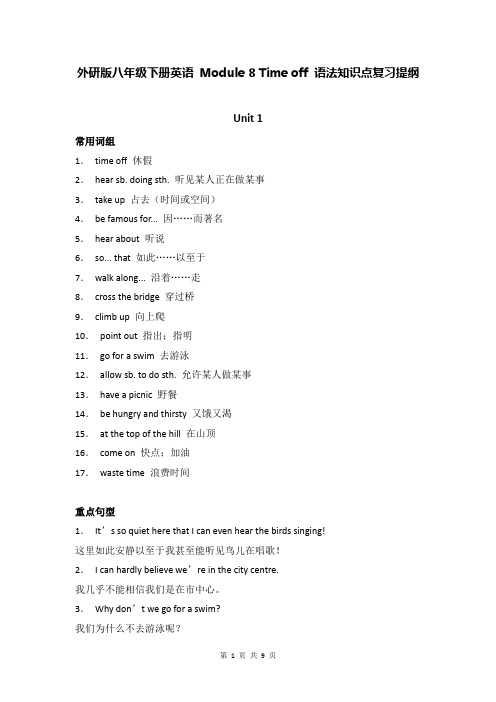
外研版八年级下册英语Module 8 Time off 语法知识点复习提纲Unit 1常用词组1.time off 休假2.hear sb. doing sth. 听见某人正在做某事3.take up 占去(时间或空间)4.be famous for... 因……而著名5.hear about 听说6.so... that 如此……以至于7.walk along... 沿着……走8.cross the bridge 穿过桥9.climb up 向上爬10.point out 指出;指明11.go for a swim 去游泳12.allow sb. to do sth. 允许某人做某事13.have a picnic 野餐14.be hungry and thirsty 又饿又渴15.at the top of the hill 在山顶16.come on 快点;加油17.waste time 浪费时间重点句型1.It’s so quiet here that I can even hear the birds singing!这里如此安静以至于我甚至能听见鸟儿在唱歌!2.I can hardly believe we’re in the city centre.我几乎不能相信我们是在市中心。
3.Why don’t we go for a swim?我们为什么不去游泳呢?4.It’s better to have our picnic at the top of the hill.我们最好在山顶野餐。
5.Let’s not waste any more time.让我们不要再浪费时间了。
要点精析1.hardly adv. 几乎不表示频度的副词。
其本身具有否定意义,用在句中时不需要再加否定词。
如:They can hardly speak French.他们几乎不会讲法语。
seldom(很少),rarely(很少)和never(从不;绝不)也是具有否定意义的频度副词。
2024八年级英语下册Module8Timeoff教案(新版)外研版
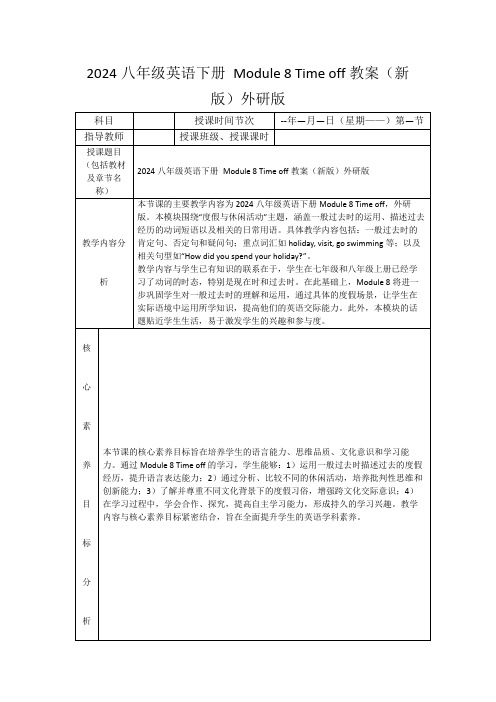
-在案例分析环节,我会简化语言,提供更多直观的例句,帮助学生更好地理解和应用。
-在课堂展示前,我会提供指导性的框架,帮助学生更好地组织语言和内容。
其他学生和教师对展示内容进行提问和点评,促进互动交流。
教师总结各组的亮点和不足,并提出进一步的建议和改进方向。
6.课堂小结时和度假活动描述的重要性和意义。
过程:
简要回顾本节课的学习内容,包括一般过去时的构成、度假活动相关词汇和句型等。
强调在现实生活和学习中,运用一般过去时描述度假经历的价值和作用,鼓励学生进一步探索和应用。
4.在课堂展示与点评环节,我发现学生的表达能力有所提高,但在逻辑性和条理性方面还有待加强。我将在未来的教学中,增加一些专门的训练,如提前给出展示框架,帮助学生组织语言和思路。
针对以上反思,我将采取以下改进措施:
-对于导入环节的问题设计,我将结合学生的兴趣和生活经验,提出更具启发性和互动性的问题。
-在基础知识讲解时,我会增加更多的互动练习,如小组竞赛,以提高学生的参与度和学习效果。
教学过程设计
1.导入新课(5分钟)
目标:引起学生对“度假与休闲活动”的兴趣,激发其探索欲望。
过程:
开场提问:“你们知道度假是什么吗?它与我们的生活有什么关系?”
展示一些关于度假的图片或视频片段,让学生初步感受度假的乐趣和特点。
简短介绍度假的基本概念和重要性,为接下来的学习打下基础。
Module 8课文知识点总结(含语法)-外研版八年级下册英语

2021~2022学年新课标外研版初中英语学习讲义八年级下学期Module 8课文知识点总结笔记Module 8 Time off语法:that引导的宾语从句一、放在动词后面的句子,称为“宾语从句”二、可分为三类:一类是that引导的宾语从句;一类是whether/ if引导的宾语从句;一类是连接代词,连接副词引导的宾语从句。
三、that引导的宾语从句1.宾语从句的引导词是that,当谓语动词表示肯定的概念,如“希望”“相信”“知道”或“说”时,后面的句子一般用that引导,that没有任何意义。
只有语法功能,目的使读者清楚后面的句子是宾语从句,that可省略。
接that引导的宾语从句的动词有:believe, expect, explain, feel, hear, hope, imagine, prefer, promise, report, say, see, tell, think, understand, warn, wish 等。
引导that用于下列情况时不可省略:(1)当宾语从句的主语是that时,Eg: He says that that is a useful book.(2)当从句前有插入语时Eg: It says, on the card, that it is made in China.(3)当宾语从句中含主从复合句时Eg: I’m afraid that if you’ve lost it, you must pay for it.(4)当两个或多个宾语从句由并列连词连接时,除第一个从句中的that 可省略外,其余从句中的that都不可省略Eg: He said (that) the film was very interesting and that he enjoyed seeing it very much.2.宾语从句的时态:(1)主句是现在的某种时态,那么宾语从句的时态可根据实际情况而定Eg: (1) I remember he gave me a book yesterday.(2) He has told me that he’ll leave for New York tomorrow.(2)如果主句是过去的某种时态,宾语从句一定要用过去的某种时态。
外研版八年级下册英语 Module 8 知识点总结
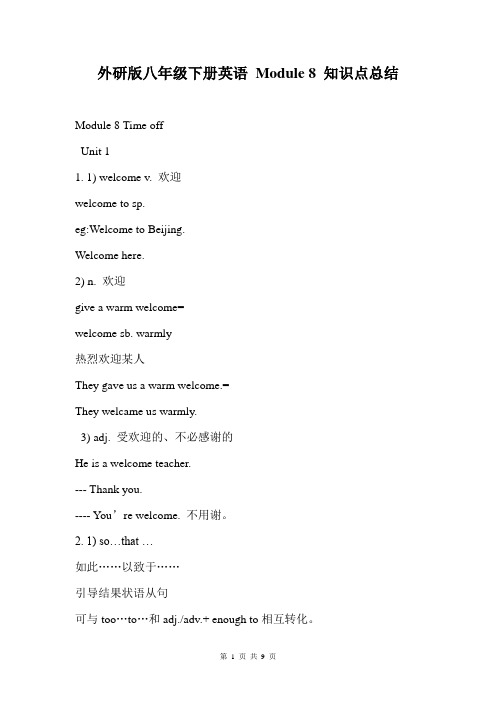
外研版八年级下册英语Module 8 知识点总结Module 8 Time offUnit 11. 1) welcome v. 欢迎welcome to sp.eg:Welcome to Beijing.Welcome here.2) n. 欢迎give a warm welcome=welcome sb. warmly热烈欢迎某人They gave us a warm welcome.=They welcame us warmly.3) adj. 受欢迎的、不必感谢的He is a welcome teacher.--- Thank you.---- You’re welcome. 不用谢。
2. 1) so…that …如此……以致于……引导结果状语从句可与too…to…和adj./adv.+ enough to相互转化。
He was so angry that he couldn’t say a word. =He was too angry to say a word.=He wasn't happy enough to say a word.He ran so quickly that we couldn’t catch up with him(赶上).2) so that以便、为了、目的是引导目的状语从句可与in order that/to + v.相互转化He works hard so that he can make a lot of money.=He works hard in order that he can make a lot of money. = He works hard in order to make a lot of money.他努力工作为了挣许多钱。
3. hear sb. do sth.听到某了做了某事I often hear her play the piano.hear sb. doing sth.听到某人正在做某事I heard them singing in the room just now.4.1) hardly = almost not adv.几乎不位于be动词/助动词/ 情态动词后,行为动词前。
- 1、下载文档前请自行甄别文档内容的完整性,平台不提供额外的编辑、内容补充、找答案等附加服务。
- 2、"仅部分预览"的文档,不可在线预览部分如存在完整性等问题,可反馈申请退款(可完整预览的文档不适用该条件!)。
- 3、如文档侵犯您的权益,请联系客服反馈,我们会尽快为您处理(人工客服工作时间:9:00-18:30)。
英语初二下外研版module8学案-时间状语从句详解Module8PublicholidayGrammar时间状语从句时间状语从句是一个特别重要的语法项目,常见的用法要紧有:1.由when,while,as引导的时间状语从句。
Whenyouthinkyouknownothing,thenyoubegintoknowsomething.当你以为自己一无所知的时候,你确实是在开始明白一些事物了。
Whentruthisburiedunderthegrounditgrows,itchokes,itgatherssuchanexplosiveforceth atonthedayitburstsout,itblowsupeverythingwithit.当真理被埋在地下的时候,它在生长,它感到压抑,它蓄存着这么一种爆炸性力量,一旦冒出,它就会炸破一切!Strikewhiletheironishot.趁热打铁。
WillyouwatchmyclotheswhileIhaveaswim.我游泳的时候,请你照看一下我的衣服。
Youcanfeeltheairmovingasyourhandpushesthroughit.当你的手在空气中挥动的时候,你就能感受到空气在流动。
Ourheadmasterlaughedasshespoke.我们的校长边谈边笑。
注意:when,while和as的区别:when引导的从句的谓语动词能够是连续性的动词,又能够是瞬时动词。
同时when有时表示“就在那时”。
Whenshecamein,Istoppedeating.她进来时,我在吃饭。
WhenIlivedinthecountryside,Iusedtocarrysomewaterforhim.当的住在农村时,我常常为他担水。
Wewereabouttoleavewhenhecamein.我们就要离开,就在那时他进来了。
While引导的从句的谓语动作必须是连续性的,并强调主句和从句的动作同时发生〔或者相对应〕。
同时while有时还能够表示对比。
Whilemywifewasreadingthenewspaper,IwaswatchingTV.(wasreading是连续性的动词,wasreading和waswatching同时发生) Ilikeplayingfootballwhileyoulikeplayingbasketball.我喜爱踢足球,而你喜爱打篮球。
As表示“一边……一边”,as引导的动作是连续性的动作,一般用于主句和从句动作同时发生;as也能够强调“一先一后。
Wealwayssingaswewalk.我们总是边走边唱。
Aswewasgoingout,itbegantosnow.当我们出门时,开始下雪了。
〔as强调句中两个动作紧接着先后发生,而不强调开始下雪的特定时间〕2.由before和after引导的时间状语从句。
注意before引导的从句不再用否定式的谓语,同时当before引导的从句位于主句之后,有时译成“就,才”。
还要注意主句和从句之间的时间关系。
当主句用今后时,从句总是用现在时;假如before引导的从句谓语用的是过去时,那么主句动词多用过去完成时,如此以便表达动作发生的先后。
After表示主句动作发生在从句动作之后。
主句和从句的动作的时间关系正好与before引导的从句相反。
如:Itwillbefourdaysbeforetheycomeback.他们要过四天才能回来。
Einsteinalmostknockedmedownbeforehesawme.爱因斯坦几乎把我撞倒才看到我。
MyfatherhadleftforCanadajustbeforetheletterarrived.我父亲恰好在信到之前去加拿大了。
Theyhadnotbeenmarriedfourmonthsbeforetheyweredivorced.他们结婚还不到四个月就离婚了。
Afteryouthinkitover,pleaseletmeknowwhatyoudecide.你认真考虑过以后,告诉我你是怎么样决定的。
Afterwehadfinishedthework,wewenthome.完成工作之后,我们回家了。
〔从句用过去完成时,主句用一般过去时〕3.由till或until引导的时间状语从句。
till和until一般情况下两者能够互换,然而在强调句型中多用until。
同时要注意的是:假如主句中的谓语动词是瞬时动词时,必须用否定形式;假如主句中的谓语动词是连续性动词时,用确信或否定形式都能够,但表达的意思不同。
如:Ididn'tgotobeduntil〔till〕myfathercameback.直到我父亲回来我才上床睡觉。
ItwasnotuntilthemeetingwasoverthathebegantoteachmeEnglish.直到散会之后他才开始教我英语。
Iworkeduntilhecameback.我工作到他回来为止。
Ididn'tworkuntilhecameback.他回来我这才开始工作。
PleasewaituntilIarrived.在我到达之前请等我。
4.由since引导的时间状语从句。
since引导的从句的谓语动词能够是连续性的动词,又能够是瞬时动词。
一般情况下,从句谓语动词用一般过去时,而主句的谓语动词用现在完成时。
但在Itis+时间+since从句的句型中,主句多用一般现在时。
IhavebeeninBeijingsinceyouleft.自从你离开以来,我一直在北京了。
WherehaveyoubeensinceIlastsawyou?自上次我和你见面以后,你到哪里去了?ItisfouryearssincemysisterlivedinBeijing.我妹妹不在北京住有四年了。
ItisfivemonthssinceourbosswasinBeijing.我们老板离开北京有五个月了。
5.由assoonas,immediately,directly,instantly,themoment,theinstant,theminute,等引导的时间状语从句。
这些连词都表示“一……就”。
IwillgotheredirectlyIhavefinishedmybreakfast.吃完早饭,我马上到那儿去。
ThemomentIheardthenews,Ihastenedtothespot.我一听到消息,马上赶到了出事地点。
AssoonasIreachCanada,Iwillringyouup.我一到加拿大,就给你来电话。
注意:hardly(scarcely,rarely)…when/before,nosooner…than相当于assoonas之意。
主句用过去完成时,从句用一般过去时。
当hardly,scarcely,rarely和nosooner位于句首时,主句应用倒装语序。
Hehadnosoonerarrivedhomethanhewasaskedtostartonanotherjourney.他刚到家,就被邀请开始另一旅程。
Nosoonerhadthesunshownitselfabovethehorizonthanhegotoutofbedtocommencework.太阳刚从地平线上升起,他就起床劳动去了。
HardlyhadIsatdownwhenhesteppedin.我刚坐下,他就进来了。
Hehadhardlyfallenasleepwhenhefeltasofttouchonhisshoulder.那个阿拉伯人刚要入睡就感到肩膀上被轻轻一触。
6.由bythetime引导的时间状语从句。
注意时态的变化:在一般情况下,假如从句的谓语动词用一般过去时,主句的谓语动词用过去完成时;假如主句的谓语动词用一般现在时,主句的谓语动词用今后完成时。
如:Bythetimeyoucameback,Ihadfinishedthisbook.到你回来时,我差不多写完这本书了。
Bythetimeyoucomeheretomorrow,Iwillhavefinishedthiswork.你明天来这儿的时候,我将差不多完成此工作了。
7.由eachtime,everytime和whenever引导的时间状语从句。
EachtimehecametoHarbin,hewouldcallonme.他每次来哈尔滨,总是来看我。
Wheneverthatmansays“Totellthetruth”,Isuspectthathe'sabouttotellalie.每当那个人说“说实在话”的时候,我猜想他就要说谎了。
YougrowyoungereverytimeIseeyou.每次遇到你,见你更年轻了。
8.由aslongas和solongas引导的时间状语从句。
这两个连词表示“有多久……就多久”。
Youcangowhereyoulikeaslongasyougetbackbeforedark.你能够随意到哪里去,只要在天黑往常回来就行。
Iwillfightagainsttheseconditionsaslongasthereisabreathinmybody只要我一息尚存,我就要反对这种境况。
when,while和as的用法:〔1〕三者均可表示“当……的时候”,假如主句谓语动词表示的是短暂的动作,而从句表示的是一段时间,三者能够通用。
例如:Imetanoldfriendofmineas/when/whileIwaswalkingalongthestreet.〔当我沿街散步时,碰见了我的一个老朋友。
〕〔2〕as和when引导的时间状语从句中,谓语动词能够是终止性动词,while引导的时间状语从句中,谓语动词一般是连续性动词。
例如:Itwasraininghardwhenwegottotheairport.〔当我们到达机场时,天正下着大雨。
〕〔不能用while引导〕〔3〕as强调主句谓语动词与从句谓语动词表示的动作同时发生;while强调主句谓语动词表示的动作持续于while从句所指的整个时间内;when能够指主句谓语动词和从句谓语动词所表示的动作同时或先后发生。
例如:Shesangasshewentalong.〔她边走边唱。
〕PleaselistentomecarefullywhileIread.〔我朗读的时候,请认真听。
〕Whenhereachedhome,hehadalittlerest.〔回到家以后,他休息了一会儿。
〕before的用法与前面三个词区别较大,具体如下:1.表示“在…..之前就…..”。
